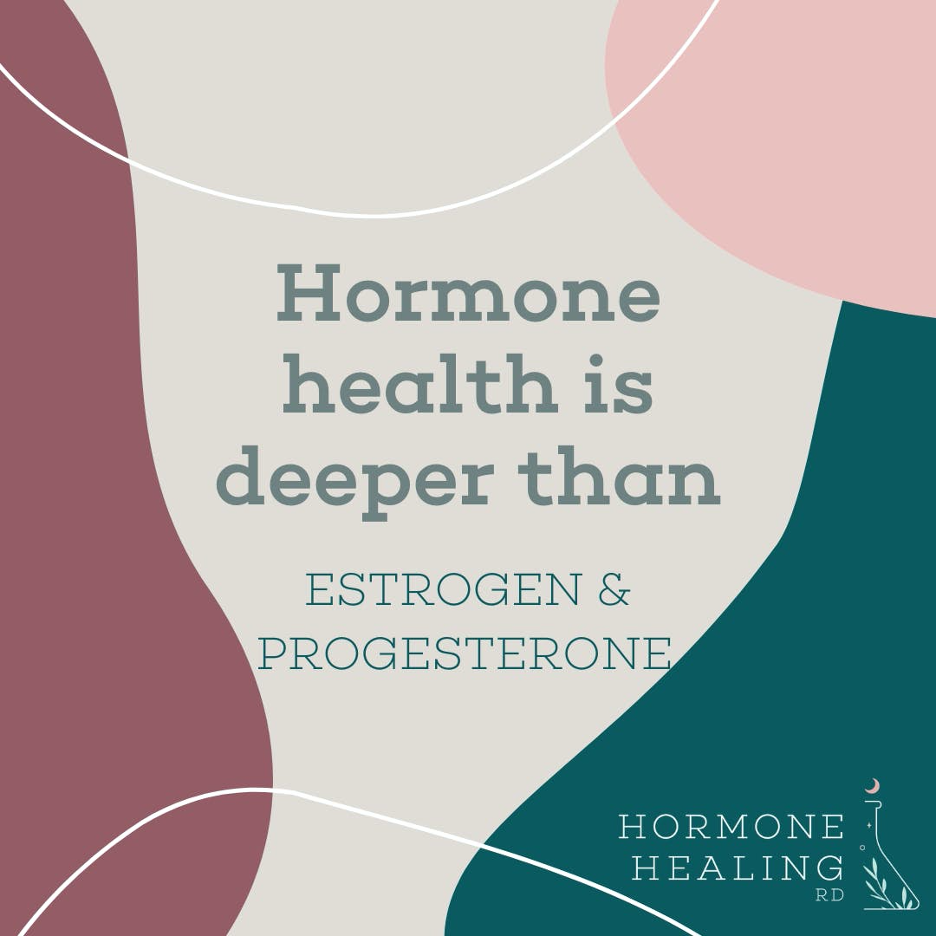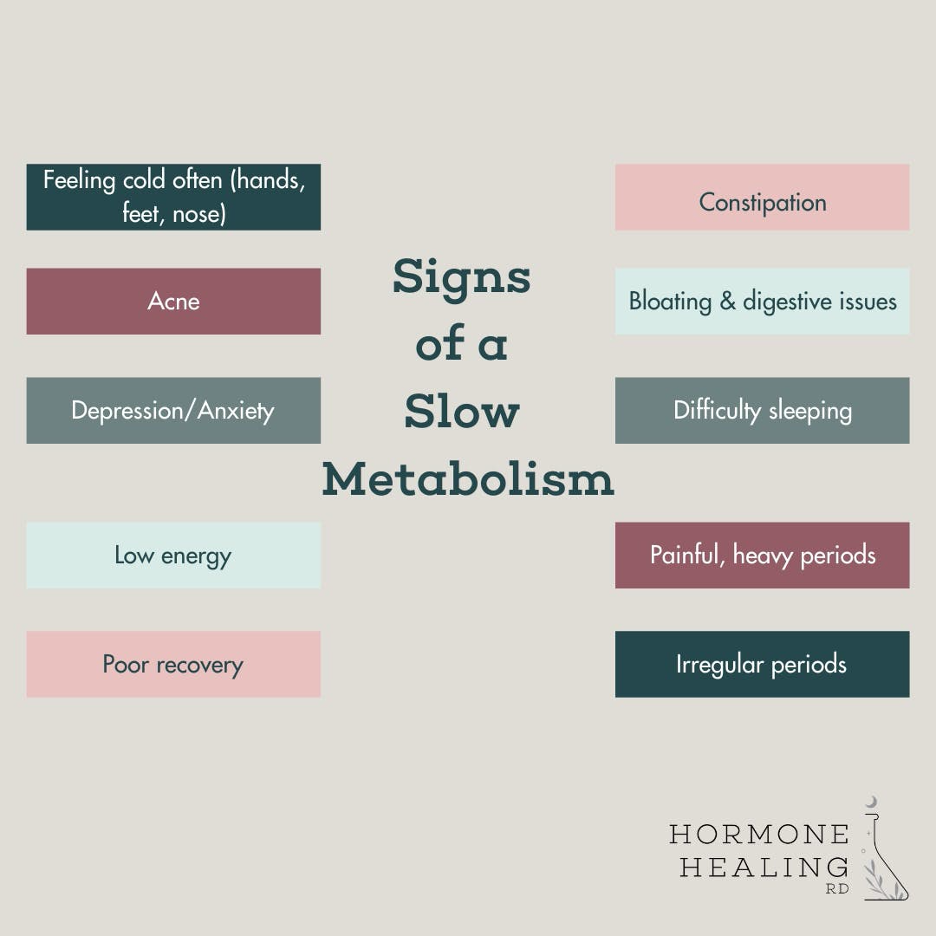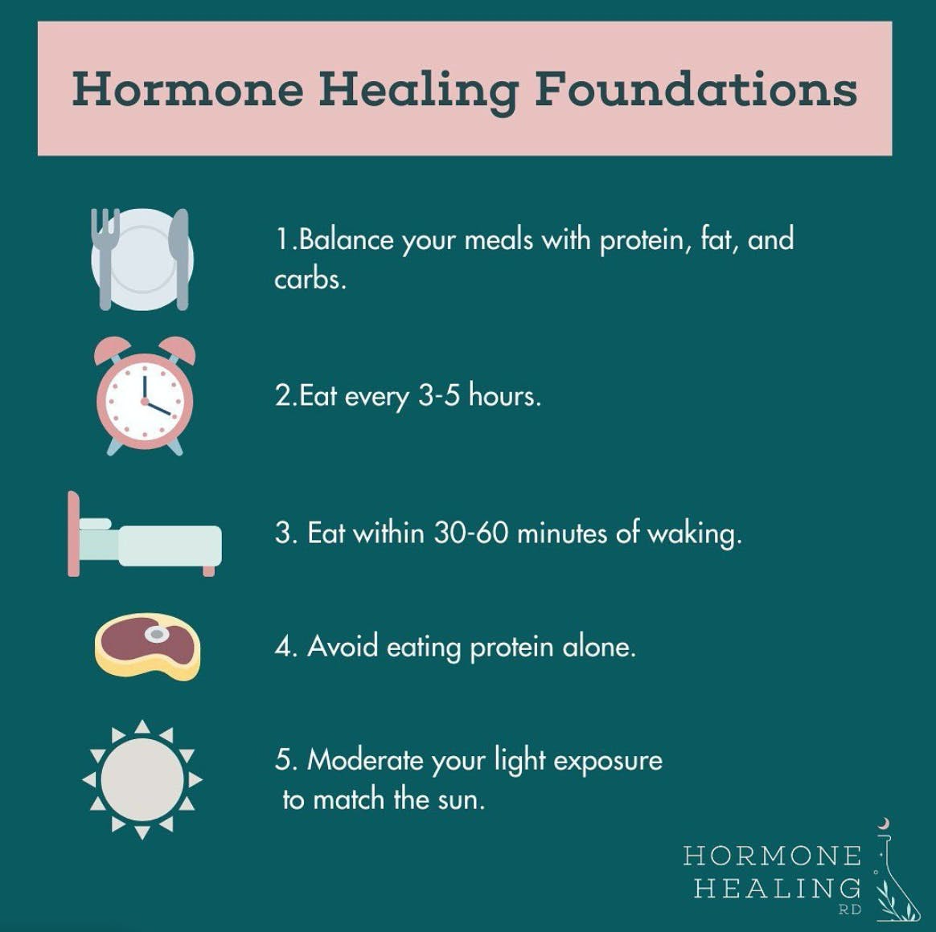Balancing your hormones is a complex topic. There are so many factors that influence hormone levels. Hormone health is more than just looking at your estrogen and progesterone levels and trying to balance them out. Do not get me wrong; they are both essential for hormone health; however, we cannot just focus on lowering estrogen or raising progesterone with supplements or even food. Our hormones are the last thing to change–everything we do impacts them. Why is this? Because optimizing our metabolism is the key to optimizing hormone health.
When estrogen starts to go up, and progesterone goes down, the body has likely been dealing with other imbalances like a sluggish metabolism/thyroid, stress, and hasn’t been able to maintain that homeostasis or balance for some time. That is why it is helpful to not only look at what you have recently been eating/how you have been living but also to think back. What has been going on in the last 6-12 months or even 2-5 years? That’s typically where the initial stressor is coming from.

I had a client who went through my Nutrition Strategies for Better Periods course and transformed her periods. She had better energy and a lighter flow, and she no longer had migraines/headaches or insane mood swings/PMS. However, she was still dealing with hair loss and acne, which was frustrating to her. But the thing is, she was able to improve her periods in two months! That is fast! Her hair and skin needed more time. Since it takes energy to grow hair and repair skin, I told her to be patient and keep doing what she was doing. She kept asking if she needed to take a specific supplement for her acne and hair loss to make results for “targeted.” I told her that it is not how the body works, and if she did not see any change within the next few months, we would do further testing. Fast-forward three months, she reached out to me to let me know her skin was finally improving, and her hair loss slowed down significantly. She was happy that she stuck with it, even though she was discouraged for a while. She started taking pictures so she could see even the tiny changes and celebrate them.
It is human nature to want to look deeper and figure things out, especially if you grew up with conventional medicine, which separates all of the body’s different systems. When I was growing up, I had terrible acne, so I went to a dermatologist. They never asked me about my periods, what I ate, or if I was stressed. So, I understand it can be hard to grasp that most of our issues are coming from one place, but that is how the body works.
What is meant by cellular level hormone health?
Many of us tend to think of how many calories we are burning when we hear the word metabolism. But I am referring to the metabolism of our cells. Each cell in our body has a little engine that uses the nutrients we give to run all of the different processes in the body. What connects all of the systems of the body? Our metabolism. It is the sum of all of the processes in the body. It is what provides energy to your body to support all operations. It occurs within the cells and feeds every part of the body. Metabolism is how you sustain life. When metabolism is slow, everything else slows down. Because thyroid hormones control metabolism, there is a gut-thyroid connection between hypothyroidism and poor digestion.
How our cells produce energy is crucial for hormone, skin, mental, and gut health. If our cells are not making energy, then all of these areas are slow. The primary organ of metabolism is the liver, our hormone superhero. Our liver processes hormones like estrogen and makes them inactive to leave the body through digestion easily. A slow metabolism also leads to intestinal bacterial overgrowth, parasites, pathogens, and yeast, which act as stressors on the adrenals and impairs thyroid function. For this reason, I focus on nutrition and lifestyle for metabolic health rather than just high estrogen/low progesterone, acne, hair loss, etc. If we focus on our metabolism, we can remedy all of our issues rather than just one. Can it take a long time to see results and changes in all areas? Yes, of course, but you will see lasting change vs. an immediate shift that goes back to the way it was. How do we achieve lasting results? The answer is quite simple, focus on the basics. Feed yourself regularly, eat breakfast, get enough sleep, get sunlight, and avoid too much blue light. Do things you enjoy and be active.
How do I know if my metabolism is slow?
Since your metabolism is involved in all of your bodily functions, you can guess that it will be the cause of so many symptoms. A slow metabolism impacts how you break down your food and how quickly it moves through your digestive tract. If slow metabolism is causing you to have sluggish digestion, then you are probably experiencing bouts of constipation. Is your body able to use the energy you eat to generate heat, or are you frequently cold? Maybe you have a diagnosed thyroid issue, or you suspect one. Do you tend to have PMS and period problems? Do you struggle with acne (a sign of insufficient detox capacity)?

How can I improve my metabolism to heal my hormones?
First things first, you may need to eat more frequently and eat enough. I recently made a blog post on meal frequency; check it out. Eating more often goes back to a cellular level in the body–our metabolism. When the engines in our cells start to slow down, what can help repair them? The answer is reducing stress, eating enough balanced meals, and eating more frequently. Eating breakfast within the first 30 to 60 minutes of waking is a great way to wake up the digestive system. The improvement in the engines’ functions in our cells can help support healthy digestion and hormones.

We live in a world that is continuously pushing us out of balance, but we can focus on simple things to help bring us back into balance. A lot of this comes back to our daily habits around food, sleep, sun, and movement. The best way to heal isn’t sexy, it’s not a crazy restrictive diet, and it’s not extreme. Our cells need nutrients to turn them into energy and run all of the systems in the body. If we have more stress, we require more nutrients. The next time you feel overwhelmed, like symptoms after symptoms pop up, and you are unsure what to do, think about your nutrition and lifestyle. Is it adding to your stress or reducing? If you want to get to the bottom of your hormone imbalance once and for all, I recommend testing your minerals—which takes a look at what’s going on inside the cell. Check out my Master Your Minerals Course, in which we teach you how to interpret your own HTMA and build a hormone-healing protocol based on your unique results.
Photo by National Cancer Institute on Unsplash
